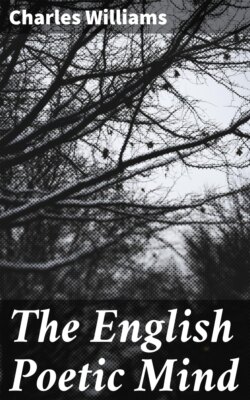Читать книгу The English Poetic Mind - Charles Williams - Страница 8
На сайте Литреса книга снята с продажи.
powerful in all sentiments of grief
ОглавлениеTable of Contents
Of exultation, fear and joy)
is introduced. In certain fortunate cases, in the poets, this ‘sensibility’ is augmented and sustained, and the two great fostering virtues are ‘beauty and fear’. These two themes run all through the Prelude, though for beauty is more often substituted the word joy. But it is a joy which is caused by beauty. And fear is, in Wordsworth, an emotion absolutely necessary to the poet’s development: he stresses it continually. When he is speaking of the modern child, whom he did not like, he complains that
natural or supernatural fear,
Unless it leap upon him in a dream,
Touches him not.
It is not a mere physical fear; it is indeed something which precludes this lesser terror. The example which he gives is his own experience, at the age of eight, when he saw the body of a dead man drawn up from Esthwaite Lake, ‘a spectre shape Of terror’. But he, whose ‘inner eye’ had often seen such things before, in fairy-tales and romances, was unsubdued, and beheld it patterned and harmonized, decorated 14 with ‘ideal grace’, and dignified as if already in poetry.
The kind of fear which he believed the young mind ought to undergo, and from which he thought modern education was separating it by over-anxious vigilance, protection, and instruction, is described in the two most famous passages of the First Book. The one tells how, after he had stolen a trapped bird from some one else’s snare, he heard
Low breathings coming after me, and sounds
Of undistinguishable motion, steps
Almost as silent as the turf they trod.
The second is when he had (again!) stolen some one else’s boat, rowed out on the lake, and seen the huge peak, ‘as if with voluntary power instinct’.
After I had seen
That spectacle, for many days, my brain
Worked with a dim and undetermined sense
Of unknown modes of being; o’er my thoughts
There hung a darkness, call it solitude
Or blank desertion. No familiar shapes
Remained, no pleasant images of trees,
Of sea or sky, no colours of green fields;
But huge and mighty forms, that do not live
Like living men, moved slowly through the mind
By day, and were a trouble to my dreams.
The second passage is an enlargement of the first, and they are both great poetry. The poetic mind is aware of ‘low breathings’, ‘sounds of undistinguishable motion’, ‘unknown modes of being’, ‘huge and mighty forms’. It is the pressure of the genius on the outer consciousness; this also perhaps is common to men.
But the poets are not content to leave it at that, as the rest of us largely have to do. An undetermined sense of unknown modes of being may be with them at their commencement, as with all of us. The difference in our developments is between those who lose that sense altogether (this is probably what is called ‘losing one’s early illusions’), those who keep it but cannot of themselves deal with it (among these are perhaps most of the readers of poetry), and those who are able to do something about it—and these are the poets. For their business is to discover and express, more and more exactly, more and more powerfully, those unknown modes of being. They work towards ‘the two great ends of Liberty and Power’. Between those two passages are lines which may well have a secondary relation to the growing poetic genius.
